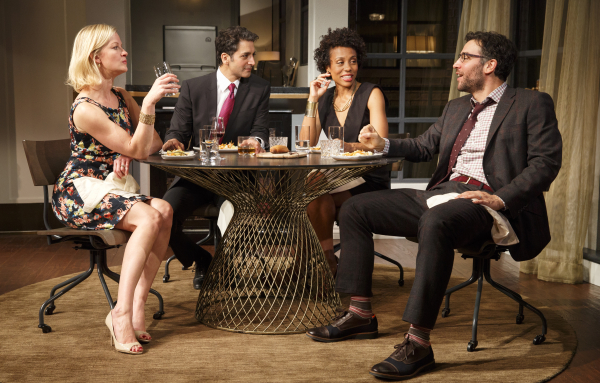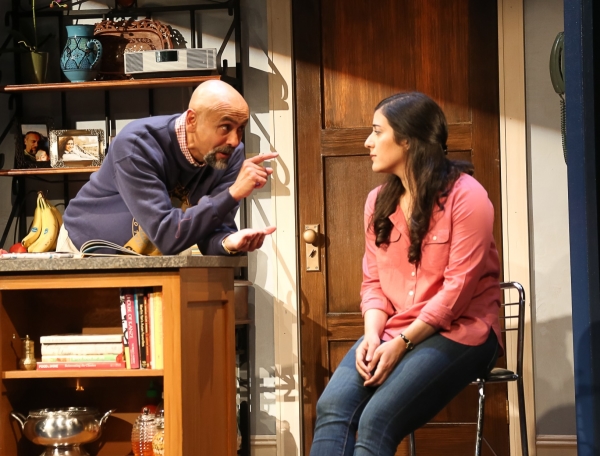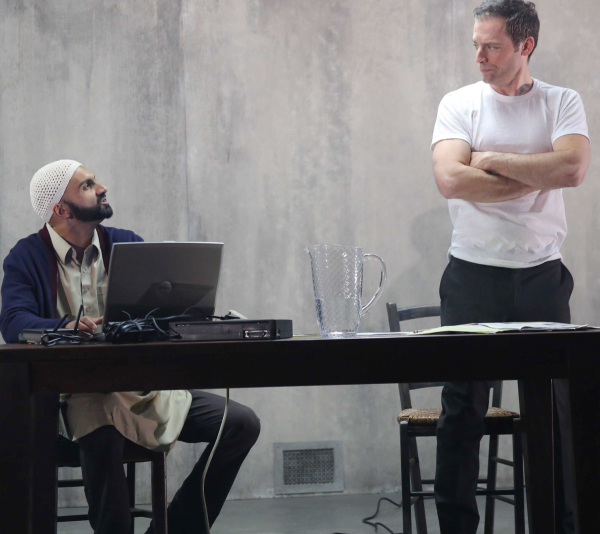Bad News and (Maybe) Better Plays (Part II)
Ayad Akhtar’s plays shed some light on our dark times.
This is part II of Michael Feingold's latest "Thinking About Theater" column.
Click here to read part I.

(© Joan Marcus)
"A landscape," said Gertrude Stein, "is such a natural setting for a battlefield or a play that one must write plays." The first striking feature of Ayad Akhtar's three recent plays is that they're set — and not always just metaphorically — on the stormiest of current battlefields: the war that shouldn't exist but does between Islam and the modern, Westernized world.
That war shouldn't exist because Islam, as a religion, has the same equivocal relationship to contemporary life as the other great monotheist religions. Neither Christian nor Jewish fundamentalists feel any great enthusiasm for female equality, homosexuality, or the host of ancillary issues linked to them, like contraception, abortion, and same-sex marriage. Nor will you find them expressing much enthusiasm for the kind of cartoon blasphemy that provoked the slaughter at Paris' Charlie Hebdo. (Officially godless Communist states probably don't like it much either. Sony didn't get hacked because North Korea thought The Interview was a laff riot.) Even a few strongholds of Mormon fundamentalism share Islam's resistance to the outlawing of polygamy.
These matters of course make up only a small part of what turns Islamic fundamentalism into terrorist violence. The part of the world in which Islam predominates is largely impoverished, a Third World realm offering an extreme contrast between a largely corrupt wealthy elite and a vast number of angry poor, its modernization only superficially appliquéd, the province of a small and shaky middle class struggling to grasp contemporary values that the rich don't care about and the poor don't comprehend. Theocracy — meaning rule by Quranic law — remains the prevailing governmental form, and built into it is the sectarian struggle, nearly as old as Islam itself, between Sunni and Shia views of the religion both practice. (Most victims of "Islamist" terrorism are other Muslims; while the world was mourning the dozen slaughtered at Charlie Hebdo, Boko Haram wiped out an entire fishing village in northern Nigeria, massacring an estimated 2,000.)

(© Erin Baiano)
Ayad Akhtar's plays deal, sanely and lucidly, with these and many more aspects of the issues confronting us. Amir, the hero of Disgraced, a lapsed-Muslim Pakistani-American who rails against Islam and has changed his name to sound Indian rather than Pakistani, nevertheless shocks his wife and friends by admitting that he felt pride at 9/11, though he was horrified by the feeling. It's not a total surprise when this deeply divided soul, under the pressure of multiple circumstances, starts retrogressing, and the part of himself he's been repressing gets revealed. Akhtar balances the situation with elegant fairness: Western mistrust and misunderstanding play their part in fueling the confusion, anger, and pent-up self-denial in a man trying to evolve himself a new identity.
The struggle of South Asians, both here and on the subcontinent, to resolve these multiple dilemmas might be viewed as Akhtar's basic theme, with all its attendant griefs. His isn't the first ethnic group to face such a conflict, and his way of conveying it, through plays constructed in a comfortably traditional Broadway form, likewise fits the tradition, a startling new dish served up in an easily graspable old container. The tense marital drama of Disgraced was followed by the sweet-natured family comedy of The Who & the What, centered on the conflict between a prosperous but conventionally pious immigrant entrepreneur and his hyper-intellectual, rebellious older daughter. Even the religious issue at the conflict's core — the daughter scandalizes the Muslim community by publishing a novel about the Prophet's love life — would have been perfectly understood by the hero of Samson Raphaelson's The Jazz Singer (1925), who had to choose between replacing his dying father as cantor at the Yom Kippur service and getting his big break on Broadway, singing what his father stigmatizes as "dirty music from the sidewalks."

(© Joan Marcus)
The Invisible Hand, the most far-reaching of Akhtar's three plays, moves the conflict back to Pakistan, where an American banker has been kidnapped by a splinter extremist group. Left stranded by his employers — he's only an underling and the ransom demand is excessive — he coaxes his captors into letting him raise the ransom himself by teaching them to invest, with hair-raising, unexpected consequences. Akhtar's Shavian streak comes out most strongly here: He has clearly studied Shaw's technique of lodging a disputable issue inside an evolving relationship.
The eerie semi-bond that builds between the imprisoned banker and his bullying captor-trainee gives the piece both an extra chilling resonance and an additional, deeply disturbing theme. Capitalism, mainspring of the Westernization that Muslim extremists so hate, is predicated on profiting at someone else's expense, by their need or from their loss. When those who see enemies everywhere learn capitalist tactics, their skill at generating profit can work hand in hand with the violence that generates only misery and death, turning the free market's "invisible hand" against those who created it. Our need to find a sane way out of the misery that creates terrorism is linked, startlingly, with the world's other gigantically pressing need — to find a viable system that distributes market goods without creating misery. Far from discovering that, we seem committed to ignoring the bad news that could spur us on to the search.
Michael Feingold's next two-part "Thinking About Theater" column will appear on consecutive Fridays February 20 and February 27.
Editor's Note: Ayad Akhtar recently appeared on CBS Sunday Morning to talk about playwrighting and Disgraced:








